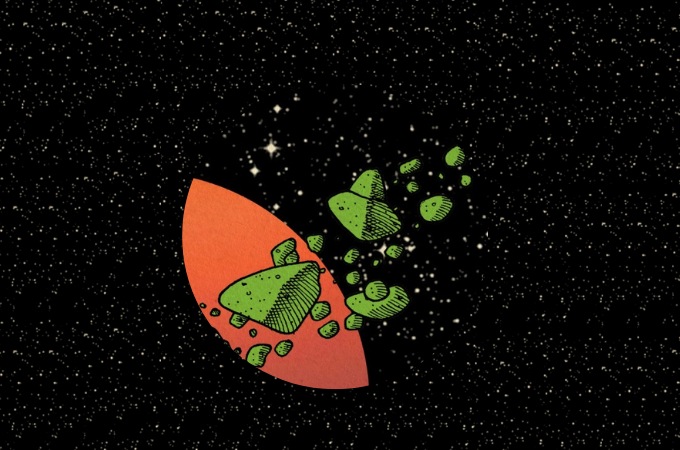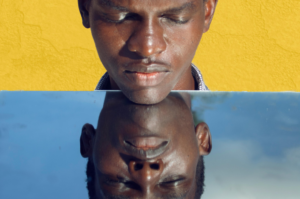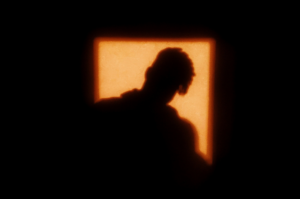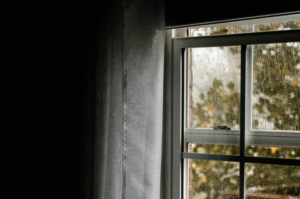
Each iris in the city bears the burning shades of autumn, ranging from light to dark.
Every eye in our firm runs surveillance programs behind its pupil. Connected through the authenticated enterprise cloud network to the central servers of the Firm. Able to detect corporate theft, infraction, abuse of work assets and more. Much more. I knew about the eyes but I only noticed the holes in our necks, stabbed into the jugular, into the carotid artery in that unsurveilled split second when my black pupils blinked silver and then back to black as the company automatically upgraded me. In that fraction of a second, when all their restraints loosened, I tried to scream.
I’d just started working for this fine establishment and I was on my third month of probation when it began. I was a graphic designer for a market research firm boasting a growing roster of foreign multinationals with tentacles steeped in every industry: manufacturing, agriculture, food industry, construction, health, technology, fashion, publishing, everything.
Before that I was unemployed for seven months living off my savings, so I hungrily signed the contract when they called me in after my interview. I was shocked that they could only offer me 3,000 pula, a salary that could barely cover my rent. How was I going to pay for transportation, utilities, groceries? They said they’d only review my salary at the end of the probation. I had to move out and find a squat room in Old Naledi that undergraduate students of a nearby university were using, which luckily was forty minutes’ walk from work, so I could make it without needing to catch a taxi-then-a-combi like I had to for my previous job.
The room I lived in was a compact space with only a shower and a two-plate stove in the entrance. Cold water, no heater. I lived cooped up in my house with no daylight and nature to water my stale growth. The windows looked out into walls and pit latrines. Dust swept itself in with flies from long-gone shit.
Early morning, I forced myself through the grueling cold to work. Everything was the same, except for last night’s buzz that was still saturating my body. It was my third guy in ten months—there was nothing special or serious about it. Sometimes it felt like my heart was drenched in fire, today it was numb.
“Perhaps his spam is inducing an adverse reaction in your body,” she said during our usual morning call as I walked to the office. Her name was Boitumelo, her nickname was Tumie, and we called her Tumza for short—a nickname for a nickname. Tumza and I called every guy’s sperm spam.
“Or maybe I’m fed up of the clone of bastards always swarming around me,” I said. “When you’re fed up, you tend to grow a third eye that tends to see the bullshit for what it is. And because bullshit is bullshit and sometimes nothing much can be done about it, you swim backstrokes through it.”
Tumza snorted. “You have such creepy humor.”
I laughed as I crossed the pedestrian-heavy road towards the Fairground strip mall, its concrete, steel and glass face reflecting the morning sun. “I haven’t seen you in a span.”
“Joh! I haven’t had a free weekend,” she said. “I’m working on a residential project, our firm’s also working on a tender, and I have to go to site later for a commercial building we’re project managing. I don’t know, man, I’m going crazy. I haven’t slept in my bed for two days. Like, I don’t know what I’m chasing anymore. And we just got our updates yesterday, so you can imagine how crazy it’s going to be.”
“Updates?”
“Ja, some new app a company is selling to our big boss.”
“Oh. Well, fuck san. That’s not a life I miss. At least you’re getting paid big bucks.”
“The nigga don’t pay—everyone in the industry knows that. I’ve been trying to jump ship for centuries, but he has his claws throughout the industry. Any whisper of me fishing around and he’s gonna blacklist me by word-of-mouth. He’s done it to others before.”
“What’d I tell you about that third eye?”
“Bra, not funny at the moment—shit, gotta go, some clingy client’s on the line. Also don’t worry about work. I’m sure they’ll be happy with your performance so far. Hang in there, choms! Your career will take off. Cheers.”
With that I was left alone with a dial tone slicing my goodbye in half. I stared at the goodbye wrapped around my gluey tongue, my tongue always trying to stick itself to things that never lasted: kisses, dickheads, soggy heartbreaks, dead-end jobs. A text message beeped into my phone. “Can’t make it tonight.” Another guy tossing aside the promise he made me. It’s fine. Promises weren’t immortal; they lay like dead animals in my teeth.
On my way to work, fatigue seethed through my blood like alcohol. I just thought that if I hung around long enough, worked my ass off, I’d clear probation, revise my contract and get a better salary. I was still sending out my resumes and somehow able to go for interviews, but unable to snag another job.
I watched the traffic flow idly and the cars looked like sheep bustling through a tight lane under the glaring heat of the Gaborone sun. Shiny sheep with hooves stomping to the same endless nightmare. My scream was trapped within the boundaries of my skin: I hate my job. I hate my job. I hate my job. I envy those who have cars: warmth and luxury surrounding them. Across from me on Samora Machel Dr waiting for the traffic lights to turn green, was a stern lady with sunglasses on in a white BMW X5, and I was wondering what she was listening to, what it’d be like to be her, living in her skin. Her skin look drabbed on expensively, exquisite and elegant at the same time. It had the K-drama glow to it. A woman in a black Mercedes drove by wearing a weave that could probably pay my rent for months. The melanin glow of her skin reminded me of sunsets. Perhaps I’d look like her if I wore her skin, too. I pressed my nose high and imagined what it would smell like. The perfume on it. I sniffed as I quickly purchased magwinya and chips from one of the street vendors that lined the road with their tables and tattered umbrellas; behind them were shacks upon shacks, clusters of dire poverty, and on the other side of the highway stood a two-story mall, an upscale lodge, a car dealer shop and more affluent businesses. Where will I be when I’m thirty years old? Or thirty-five? Will I even reach fifty? Inadequacy. You compare yourself too much to other people, I thought, trying to stop this habit. All these drivers, all these strangers turned and looked at me with blank eyes. I looked nothing like them which had to mean that I was an alien.
The office idled around in Fairground Mall on the second floor. I crossed the bypass, the parking lot, and ascended the stairs. Approaching the glass entrance door, I pressed my thumb against the finger scanner, it stung, and the door slid open. I sucked at my thumb, tasting the salt of blood. I got to my desk feeling mind-boggled.
A hand was waiting in the air for my hi-five. Everyone had on the same smile, the same voice, the same excitement. They were so happy being at a miserable job. Why was I different? Why were they happy to be in this life and I was not?
Wassup, bro
How was your weekend
Nothin’ big, just chillin’ with the fam
‘sup ma
—words floated into the air like dead emojis.
I stared at my thumb, a pinprick of blood slipping out. Did the scanner steal my blood? I looked up. A cluster of desks in an open-plan layout. It looked like we were sitting in transparent toilets, everyone watching everyone’s shitty business. This wasn’t natural. It didn’t feel right. We should be in an open, warm, collaborative space like a true team, working together. But this was best for space and work efficiency, the head office said. Most of the things that ran our lives were manufactured, designed and mandated by others.
For our late lunch that day, the manager took us down to the cafeteria to wind down and congratulate us on our hard work. The first time we had closed doors early. We thought we weren’t working. The elevator brought us to the ground-floor restaurant overlooking a garden with fountains, bird song and trees. Within thirty minutes we’d allocated ourselves into cliques on a long dining table, overflowing with chatter and mouthwatering cuisine: several mini-grills that a couple of my coworkers were already laying into. Swaths of nicely marinated boerwores and sticky chicken pieces they wolfed down whilst chugging bottles of cider and beers. One coworker, hazy-eyed and slurring words chewed on a biltong and laughed at a stupid joke the manager lodged. There was a crock filled with chakalaka; bamboo bowls with steamed madombi spattered with an assortment of herbs; bowls and plates of couscous, several cobs of corn, a steaming stew of mogodu—
“This is all so appetizing,” my coworker Puleng Maiteko interrupted my hungry, ogling eyes. “But I’d rather get a raise. Paying us with meals is so cheap.” She raised the decanter and filled her wine glass. “Might as well get stupid drunk and full.”
It entered my mind like a butterfly.
They are using our temporary hunger to lull us into something.
But I ignored the thought as I scattered some sticky chicken still glistening in marinade onto a mini-grill and it sizzled as I dished for myself. Puleng tugged at an earring, hanging like a beaded chandelier from her ear, which is a habit of hers when she’s concentrating on something bothering her.
“What’s wrong?” I asked, chewing on a spoonful of chakalaka.
“My grandmother once cooked this for our family’s usual weekend potluck gathering,” she whispered, breath perfumed by the scent of a Phumla Pinotage.
“Okay…Then what’s the problem?”
“These exact same meals…from three years ago.” She shook her head, which was elegantly wrapped in a richly colored Ankara design doek. “Never mind, it just hit me like a bad case of déjà vu. It tastes exactly the way she does it. You know no one in our family has been able to replicate the taste of her recipes.” A tear slipped down her face. “My grandmother passed away three years ago. This…just felt like she was alive again.”
Puleng drank three bottles of wine before sunset, and the manager Alefaio Isang advised the company driver to take her home.
I had also guzzled too many glasses of wine and even though I was not in as bad a state as Puleng, I hurried to the office’s unisex bathroom to relieve my protesting bladder. I stopped when I saw my colleague Keaboka Letang bent over, his head dipped into a sink full of water, hands grappling with the rim. I yanked him up, his Senegalese braids slapped me. What the fuck was going on today? He gasped for air. Stood against the sink and stared at himself in the mirror, with dark trails of mascara running down his face. He was crying. I felt whiplashed like I was at a funeral-cum-party.
‘What’s going on? Are you okay?” I asked, forgetting my need to pee.
“It’s the only way I can deactivate them. It only lasts three minutes. I don’t know why. Listen to me.” Keaboka grabbed my shoulders, his eyes wild and frantic. “You can’t see it. The holes. They use the holes. They… They’ve been selling us to their clients.”
I giggled and burped thinking he was making a joke. He speed-talked nonsensically all the time staring at his ticking watch, unable to find his cellphone.
“They use us. These bastards feel too safe and comfortable with this thing they installed in us.”
“What?” I staggered back, tipsy and confused—stunned also because he was generally a quiet person who focused on his assignments, mostly managing the social media pages of our clients, photoshoots, booking influencers and models, etc.
“What are you talking about?” I felt terribly sorry for him and offered consoling arms. “Relax eh. Whatever happened we can probably sort it out with— ”
“You’re not listening to me.” He grabbed my shoulders, wringing them and I expected myself to crack like an egg and spill all over the bathroom floors. “Get out. Do not renew or upgrade your contract. Don’t sign anything. They have a pipeline where they sell us—we are the products—it’s those fucking updates — the holes—they plug—”
The doors slammed open. Security guards thundered in. Keaboka started hiccupping and floundering in their grips.
“He’ll be alright. He has a condition and is sometimes unwell. We’re taking him to the office doctor,” they said to me as they gathered Keaboka out. One guard remained, making sure I didn’t follow them.
“This must be a shock to you. Why don’t you rejoin the others?”
By Monday I had started to forget the trauma of my coworkers when the manager called me into his office to let me know that my probation was over and that they were finally reviewing my contract. I would be upgraded to consultant! With benefits! A better salary! And potential to upgrade further to housing benefits, medical and more!
There was one clause. My contract included a stipulation that I would have to be installed with new, non-invasive pill-form technology WeUs—developed by the Nairobi Tech Hub of one of their prominent clients. If I agreed then I could keep my job. If I didn’t, then my current contract would run its course and I’d be out of work by the end of the year, jumping back into the hungry ocean of the unemployed. I had two-months’ worth of pending rent. I had no savings, no belongings, nothing substantial to my name. My landlord had been threatening to throw out my belongings whilst I was at work; the thought of coming home to find my entire home outside the boundary wall had made me desperately change the locks which set her off. This job was my oasis.
“It’ll be worth it in the end,” our higher-up said, adjusting his tie. He was an European man with a balding hairline, stocky fingers and a certain kind of confidence that intimidated me. “It’ll make your life so much easier. We’re partnering with a highly-esteemed technology company, InSide, that’s offering our employees absolutely free subscription to their app. It will help you increase your productivity and streamline your life. You will be the best you that you can be. You’re valuable to us and we’d hate to lose you.” He leaned back into his chair, his hazel eyes boring into me. “We’re looking to expand our company into several countries: Zambia, Dubai, South Africa, Nigeria”—he counted them off with his fingers as if they were already conquered—“and we want to use this year to groom you because we see you eventually heading customer relations in Dubai once you cut your teeth in the region. That is of course, if you stay with us.”
I swallowed deeply at the thought of living in a what was widely regarded as the world’s most technologically advanced city and of reaching the summit of the corporate ladder. I just had to swallow a pill that would deposit nanobots behind my eyes and connect me to the firm’s network, ferrying data to and fro. Of course, I’d be paid a minimum sum of 100,000 pula which felt like a shitload of money just to swallow a pill.
There was another butterfly thought in my mind. I ignored it.
I signed the contract and took the pill.
When I got home, I felt odd. A surge of anemia and fever overwhelmed me. I steadied myself with the walls of my apartment, wading through the heavy dark until I stumbled into bed, out of breath. I had little energy to do anything, to nourish myself or call an ambulance. I felt wrecked with an exhaustion that I prayed sleep would solve. When the bright morning sun opened my eyes, I was urged by a tightening in my gut that rushed me to the bathroom to vomit my entire self out. I sat propped against the bathtub, wiping sweat from my face. I actually felt better. Brushed my teeth. Had breakfast. Showered and went to work. I had the best workday I’d ever had in my life.
Before long, I moved to a new apartment and bought new clothes. I went out more and had even more meaningless encounters with men I didn’t care about, laughing over these dalliances with Tumie who’d gotten a promotion. Then I started having strange tendencies toward staying late at work. Smiling at the manager who flirted with every woman in the office. Then there were the black outs. I’d be locking up after work, heading for a combi—then nothing but a complete deep abyss in my memory. My 6am alarm would blare, I’d wake up in bed feeling sore, like I’d spent the day before in an HIIT cardio workout, unable to recount where I was the night before or how I got home. Shortly after, I used my 100,000 pula as a down-payment for a house in an exclusive gated community for employees of our firm. We worked together. Lived together. Spent weekends together. Carpooled to jols and vacation homes and work trips.
After months and months of this routine, I knocked off one night and stood in the dark foyer of my home, crumbled into a pile of skin and bones on the floor and cried, heaving hot breaths, not knowing why I was crying, but a deep chasm of hurt somewhere in my chest thronged and thronged with pain. I reached for my cellphone, but my front door flew open. The security guards of our estate. With flashing lights and heavy boots. “Everything alright? We heard the alarm.”
“Alarm? What alarm?” I asked.
They gathered me up. “It’s going to be alright. The doctor’s on his way.” Laid me on the living room couch. A man appeared. In his gown. Spectacles and sleep-swept hair. My neighbor. Something glinted in his hand, reflecting the slim shape of moonlight sliding through a crack in the curtains. A syringe. “Shh, it’s okay, sweetie. This will help.” The guards’ hands tied me back as I struggled. A sting. An urge. Slowly I became swallowed into a current of sedation; my eyes slipping me into a prison of dark, glimpsed at the doctor’s hand-held device, its glass display a map of our estate, little dots with all of our names. Some green. Some red. I was red, changing into amber, changing into green as I fell into a forever deep slumber. And then I was gone. And my body became theirs. In the morning I got up. Breakfast. Showered. Dressed. Carpooled with my colleagues in a state of silence to work.
Later in the afternoon, I was upgraded.
That’s when I saw it.
I was standing in the conference room, presenting concepts to a client when I realized all of my co-workers had holes in their necks. Only half a decibel of my scream escaped as a gasp. I composed myself and seamlessly continued with my presentation on Zulu motifs and geometric shapes to use as patterned stories on their textile range. The client was a burly old man, with several subsidiaries on the continent, aiming for trendy and inclusivity. He was pleased with our proposal to make his product more accessible to their target demographic: hip, female, mid-20s to early 30s.
My next meeting came at lunch. A foreign furniture designer with staff and whose company had 17 operations in African countries, but whose profits for his furniture sect were experiencing a stiff dive due to a burgeoning rival: a local competitor. He wanted to add a look of diversity to his furniture range and asked which tribe I was from. Bangwato.
He mused, thought perhaps it’d be interesting to color the themes of his work with this mentioned ethnic background. I tried to protest but the sounds did not come out of me, choked back, like my scream.
After the meeting, I resigned to my desk, chewed on a chicken sandwich and swallowed a protein shake, clicking, tapping, drawing out designs on my screen. In that split-second update, I had seen it all. The holes in our necks, barely hidden behind chiffon and silk and wool. They have done something to us.
It’s funny when something irrefutably terrible happens and people say, “How can such a thing happen? This is absurd. It’s against the law.” But evil flows where it flows. Through gaps and loop holes and human beings. Indifferent to laws legislations policies.
Nothing halts it,
except,
sometimes, a sacrifice.
That afternoon, a man in blue coveralls that looked like a cross between a doctor and mechanic casually walked up to me in the kitchen, carrying a sharp tool. I tried desperately to move but some invisible force kept me rigid. He pierced the hole in my neck with it and fondled my veins. “Just doing some maintenance work on your ports,” he said, whistling. His fingers were grimy with greed. Oil or something bitter-tasting slicked down my throat. I struggled and finally got an arm to move.
“Stop resisting. Part of the contract you signed.”
The man hooked his steel-boot onto my shoulder as he twisted the sharp object into my neck. All I could do was remain still, as pain rattled in my body like branches in a wild windstorm. Inside the shackles of my skin, behind the bars of my bones I was screaming, “No!” “Somebody help me!” “Get the fuck off me!” “I’ll fucking kill you!” “I’m going to burn this building down!”
No sound escaped my lips.
The man jumped off my shoulders when he was done. “Alright, you can get back to work.”
I stroked my neck and felt a deep dent digging into my carotid vein.
And then, against my own mind, I turned and went back to my desk. We sat in rows, aligned, ramrod backs, our chins high. Each one of us a well-oiled cog of the workplace machine.
There was of course always the odd concerned citizen, who occasionally noticed something off about us. The weird gropes. The frozen smiles. The doe-eyed expressions. The unprovoked tears. The silent hallways, offices, lunchroom. Our persistent abnegation posing as customer service. Then the reporters would come. Then the police would come. We’d smile mildly and reveal nothing wrong in this fine establishment. No matter how much they investigated every nook and cranny of buildings and emails, they couldn’t find the secrets stacked in our bodies. What they found were good benefits, fully paid housing, medical aid, travel allowance, good hospitality, educational grooming, and very loyal unmarried employees who occasionally loved to sleep with their bosses and whose minds and histories were contained in a database monitored by the data analysts and employee management consultants of our established firm.
The company grew quickly to manage operations in 29 African countries and was touted for its high diversity hiring and marketing strategies. The company suckled our diversity from our DNA and nervous systems, spooled and aggregated it into its network to create 100% authentic indigenous products, used for concepts in fashion shows, architectural designs to win local tenders.
They didn’t need to get close to us to have us open our mouths, they were already inside our bodies listening to every thought pattern and whispers from even our grandparents in the genes of our bodies.
The firm was touted for being revolutionary. They mined our stories to flavor just the right amount of diversity in their clients products which accounted for their sky-high profits. They mined the minerals, diamonds and jewels of our very thoughts and histories and cultures that had been buried in our brains; the emblems, cultural motifs were woven with the dialect of our pain into their indigenous furniture designs, patterned textiles. It was all the market research they and their clients would ever need.
In our heels and short dresses and men the bosses fancied, we’d shuttle from our desks to the manager’s offices, to hotel rooms and secret getaways. The directors, the managers, the clients had nothing to fear. Their technology sat in us, maimed our voices before it could ever bite them; intercepted the tšatšarag neuromuscular signals shuttling from our brains to our vocal cords. It lynched those muscles in your throat just when you wanted to scream and cry and bleed truth.
I had authorized this technology, agreed to the terms and conditions.
Now: I couldn’t move, I couldn’t breathe, except under the dominant hand of their technology. They were our voices and we were their voice. Their face. Their ambassadors. We were locked behind our irises, and I found my skin feeling like artificial material, my legs stacked onto a platform, frozen wide eyes staring out into a stream of satisfied customers.
They’d learned how to imprison my thoughts in my body, but I am starting to feel free inside this mind of mine even though it doesn’t fully belong to me. Maybe just maybe, when the next update comes and I get a glimpse of freedom again, I will do something with it.









Penprince October 19, 2020 11:21
This was an awesome, terrifying but wonderful piece.